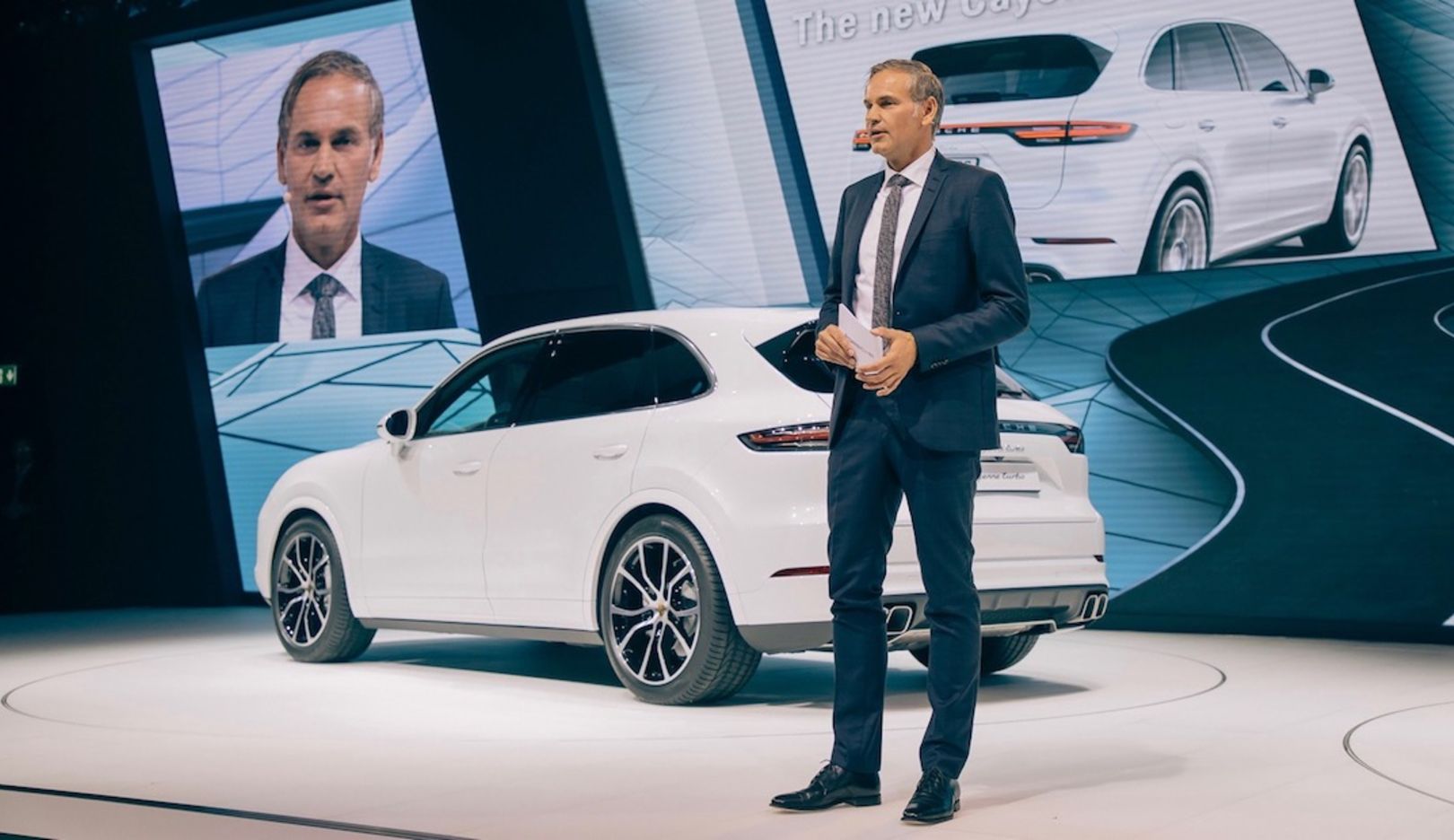The four-litre V8 biturbo engine delivers 404 kW (550 hp; Fuel consumption combined 11.9–11.7 l/100 km; CO2-emissions 272–267 g/km). The increased driving dynamics are based on the combination of innovative technologies, such as active aerodynamics including roof spoiler, controlled three-chamber air suspension, mixed tyres and the new high-performance brake. With additional options, such as rear-axle steering or electric roll stabilisation with a 48-volt system, the SUV can even achieve the driving characteristics of a true sports car. The new Cayenne Turbo accelerates from zero to 100 km/h in 4.1 seconds (3.9 seconds with the Sport Chrono Package) and reaches a top speed of 286 km/h.
Even sharper design
With an exclusive front end and the LED main headlights of the Porsche Dynamic Light System (PDLS), the Cayenne Turbo has an appearance that is both dominant and independent. At night, the new Turbo sets itself apart from other Cayenne models with its double-row front light modules. The side view is characterised by standard 21-inch Turbo wheels specially reserved for the top model, in widened wheel arches with painted wheel arch trims. The twin tailpipes, specific to the Turbo, are the key distinguishing features on the rear end. The door trims and rear apron are painted in the exterior colour. The completely new interior demonstrates the increased spread of the Cayenne Turbo: more sportiness and more comfort at the same time. Virtually all the vehicle functions of the fully networked SUV can be displayed and operated using the high-resolution display and touchscreen of the Porsche Advanced Cockpit. Among them, for example, is the BOSE® Surround Sound System with 710 watts, fitted as standard. Drivers and passengers experience this top-of-the-range model in sports seats with 18-way adjustment. The integrated headrests are a new feature and are also reminiscent of the 911. All seats and the multifunction sports steering wheel in an exclusive Turbo design are heated as standard.
Greater power, greater torque: biturbo eight-cylinder with 550 hp
At the heart of the Cayenne Turbo is the new four-litre V8 engine with twin turbocharging. With an output of 404 kW (550 hp), it exceeds the engine of its predecessor by 22 kW (30 hp), while the maximum torque of 770 Nm represents an increase of 20 Nm. The new eight-speed Tiptronic S converts both into acceleration and speed by means of the active all-wheel drive Porsche Traction Management (PTM). The new Turbo sprints to 100 km/h in 4.1 seconds (3.9 seconds with the Sport Chrono Package) and reaches a top speed of 286 km/h. As is characteristic for new engine generations, the exhaust turbochargers are arranged inside the cylinder V, in the “central turbo layout”. The shortened exhaust paths between the combustion chambers and the turbochargers mean that the engine is especially responsive, while the central turbo layout results in significantly improved power delivery. Another advantage is the compact construction of the engine. This enables a lower installation position, which has a positive effect on the driving dynamics: The centre of gravity is lower and the cornering precision is higher.
Active chassis with three-chamber air suspension and mixed tyres
The new lightweight chassis of the Cayenne Turbo combines the best of three worlds: the precision of a sports car, the comfort of a saloon and the adaptability of an off-road vehicle. In particular, the combination of the new three-chamber air suspension with the active shock-absorber system PASM extends the range considerably. The concept of the new mixed tyres with standard dimensions of 285/40 at the front and 315/35 at the rear comes from sports car construction and produces even better longitudinal and lateral power transmission. Three air chambers per spring strut are used in the adaptive air suspension design, therefore the chassis is able to map different spring rates. With six selectable height levels, the ground clearance can be manually adjusted to suit the offroad terrain. They are also actively controlled via five new driving programmes for road journeys and off-road journeys. Complemented by optional rear-axle steering, the electric Porsche Dynamic Chassis Control (PDCC) roll stabilisation connected to a 48-volt vehicle electrical system and Porsche Torque Vectoring Plus (PTV+), the new Cayenne Turbo achieves the driving dynamics of a sports car. At the same time, its everyday suitability in terms of parking and turning manoeuvres is improved, as is the comfort level.
First SUV with adaptive roof spoiler and new high-performance brake
The new Cayenne Turbo is the first SUV to have an adaptive roof spoiler as a component of its active aerodynamics. Depending on the position, this optimises efficiency, increases downforce on the rear axle and, in the airbrake position, shortens the braking distance from higher speeds. At full braking from 250 km/h, the SUV comes to a stop up to two metres earlier as a result. The aerodynamic system therefore complements the effect of the new high-performance Porsche Surface Coated Brake (PSCB) which takes care of deceleration in the Cayenne Turbo as standard. The tungsten carbide layer applied to the steel discs increases braking performance and resistance to wear while reducing the amount of brake dust at the same time, meaning less dirt on the rims. The top system in the programme remains the optional Porsche Ceramic Composite Brake (PCCB).
The new Cayenne Turbo is available to order now, with the market launch in Europe scheduled for the end of 2017. In Germany, the top model of the SUV model line costs EUR 138,850 including VAT and country-specific features.
Consumption data
Cayenne Turbo: Fuel consumption combined 11.9–11.7 l/100 km; CO2-emissions 272–267 g/km
911 GT2 RS: Fuel consumption combined 11.8 l/100 km; CO2-emissions 269 g/km
911 GT3: Fuel consumption combined 12.9 – 12.7 l/100 km; CO₂ emissions 290 – 288 g/km
Cayenne: Fuel consumption combined 9.2–9.0 l/100 km; CO₂-emissions 209–205 g/km
Cayenne S: Fuel consumption combined 9.4–9.2 l/100 km; CO2-emissions 213–209 g/km
